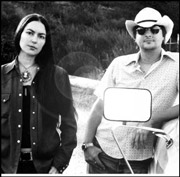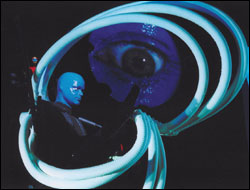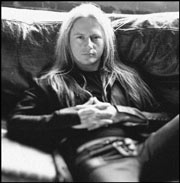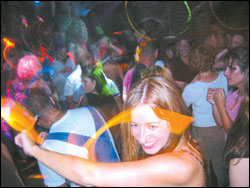JESSE SYKES & THE SWEET HEREAFTER
WINDFRED E. EYE, AMY BLASCHKE
Chop Suey, 206-324-8000, $8
9 p.m. Fri., Dec. 6
IT DOESN’T COME so much as a warning than a friendly heads-up: “Jesse and Phil like to tell lots of stories,” explains band wrangler Julianne Andersen of her clients Jesse Sykes and Phil Wandscher, the leaders and lovers, heart and soul of Jesse Sykes & The Sweet Hereafter. “Oh,” she adds, “they like alcohol, too.”
Done. A quiet bar is needed for this interview, somewhere within staggering distance, like Ballard. Sykes and Wandscher are well acquainted with the neighborhood as residents and musicians; in fact, they met here four years ago at the venerable Hattie’s Hat. So the Thaiku restaurant, an inscrutable Chinese apothecary of a saloon on Ballard Avenue, is chosen for both its potent potions and the privacy of its basement haunt, the usually off-limits Opium Den.
“Jesus,” laughs Wandscher as we make our way through wrought-iron gates, down steep steps to a narrow walkway, past a mattressed berth, and into a dimly red lit booth, “maybe we should do this lying down. You’re not holding, are you?”
The Opium Den is a setting well suited for languid dreams and foggy remembrances, the kind that inform the Hereafter’s dreamy debut Reckless Burning. Sykes’ longing love songs, embellished and enveloped by the haunted echo of Wandscher’s guitar and (Walkabout) Anne Marie Ruljancich’s sweet, mournful violin, can fill a space simply by drifting through, tangible but untethered, like blue smoke passing through amber.
More than partners in musical crime and rhyme, Sykes and Wandscher are a true couple: they finish one another’s sentences, step on each other’s punch lines. Sharing a box of Marlboro Reds and a faulty Bic, they banter, poke, smoke, and joke their way through two hours of easy conversation.
Sykes came to Seattle from New York state a decade ago. “I worked at the Athenian Inn in Pike Market. I started at 6 in the morning ’cause they had 6:30 Happy Hour. There’d be like 50 curmudgeonly old dudes waiting to buy 40-cent beers. They’d stay all day, ignoring the little sign that said ‘No Homesteading.’ God, the stories they would tell, I loved them. It was before Sleepless in Seattle and the whole revitalization thing. I really miss the early ’90s. It’s still good, but different.”
Wandscher, originally from North Carolina, arrived in town back in 1997. He had already gotten a taste of rock world reality—some of it quite bitter—playing with combustible alt-country act Whiskeytown. When he met Sykes, she’d just left a bad marriage and the local band Hominy. Although the personal spark was immediate, the musical alliance took longer.
“Phil was really reluctant to work with, well, his girlfriend,” says Sykes. “But it just kinda morphed anyway; it was inevitable. People will warn you, but I like working with someone you’re in a relationship with. There’s a greater level of intimacy and trust.”
“You’re not as worried about hurting someone’s feelings,” interjects Wandscher. “I think one of the strongest things I brought to Whiskeytown was calling bullshit on things, asking why, knowing when to leave something alone. Editing in writing is so important.”
“Yeah,” smiles Sykes, “and when you’re sleeping with someone, it’s actually a lot easier to say ‘Fuck you’ or ‘That’s a shitty song.'”
Collaboration involves the entire band, which along with Ruljancich includes bassist Bill Herzog (Neko Case, Citizens Utilities) and drummer Kevin Warner (Evangeline). “I may write the words and melody,” says Sykes, “but everyone is part of the weave, everyone is part of the fabric.”
“I think there’s a lack of instrumentation on a lot of records today,” Wandscher says. “It’s either all about the voice or the beat. I like that my instrument has a voice, that it’s not fighting Jesse or the other instruments. We have a classic rock orientation, even if it isn’t loud, like Tom Waits or Bob Dylan. It isn’t background music; still, you’re not forced to sing along. It doesn’t disrupt your train of thought. It paints a backdrop for whatever is on your mind.”
THAT BACKDROP WAS well realized during a recent set at the Crocodile, where the band opened for longtime friend Neko Case. Songs drifted, shapes shifted, although the tempo only occasionally rose. Yet there was real tension and anticipation in the intertwining sounds emanating from the stage. The audience, sparse at first, quickly filled out, then actually shut up and listened.
Sykes’ only complaint was the lack of time for between-song stories. No opportunity to recount the couple’s tales of cross-country train trips or living on backroads out of their beloved ’69 Ford pickup. (“It’s our muse,” says Sykes of the couple’s trusty ride. “It’s never let us down,” Wandscher agrees. “I don’t even have a spare tire.”) There’s no chance to tell of tossing a Big Gulp at a horn-pounding SUV on the Sunset Strip, or downing tequila shooters one New Year’s Eve with J.Z. “Ramtha” Knight and actress Linda Evans—not even the one about the smarmy used-car salesman who told Sykes she could make a lot more money turning tricks on Aurora than waitressing. Instead, Sykes’ stories remained in the songs, the vivid snapshots of “Doralee,” “Reckless Burning,” and “Lonely Still.”
“I write vignettes about the residual shrapnel left over from dreams,” Sykes offers, “the stuff that stays with you all day.
“Are my songs sad? Well, I think everything is kinda sad. When I was a kid, the Monkees’ ‘I’m A Believer’ made me sob. Still, I think the songs are quite hopeful. Even when you’re melancholy, you’re still resonating, you’re still alive, you’re still beautiful.
“Even if it’s something you can’t quite define.”









